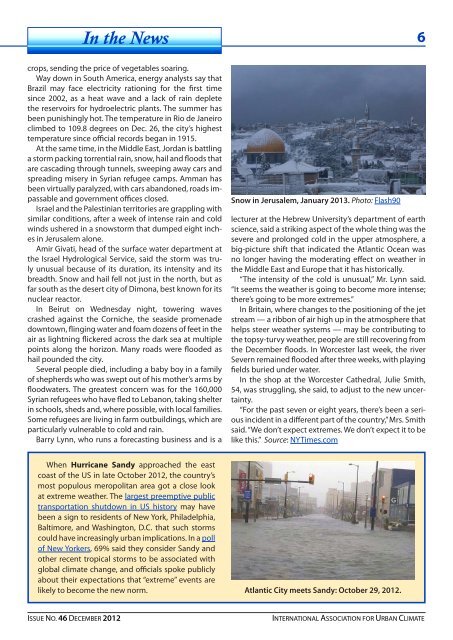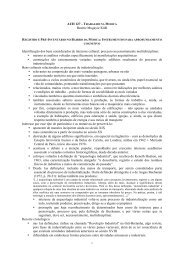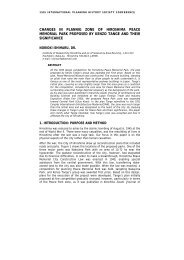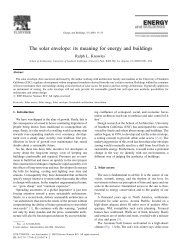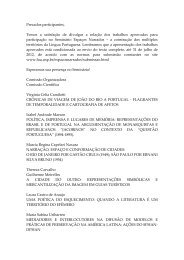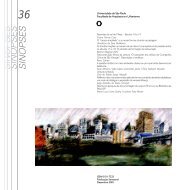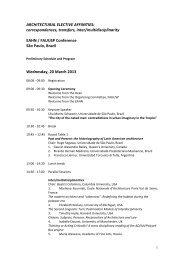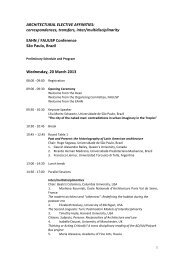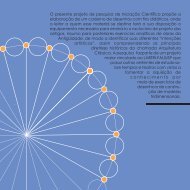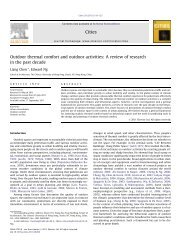Urban Climate News - FAU
Urban Climate News - FAU
Urban Climate News - FAU
Create successful ePaper yourself
Turn your PDF publications into a flip-book with our unique Google optimized e-Paper software.
In the <strong>News</strong><br />
crops, sending the price of vegetables soaring.<br />
Way down in South America, energy analysts say that<br />
Brazil may face electricity rationing for the first time<br />
since 2002, as a heat wave and a lack of rain deplete<br />
the reservoirs for hydroelectric plants. The summer has<br />
been punishingly hot. The temperature in Rio de Janeiro<br />
climbed to 109.8 degrees on Dec. 26, the city’s highest<br />
temperature since official records began in 1915.<br />
At the same time, in the Middle East, Jordan is battling<br />
a storm packing torrential rain, snow, hail and floods that<br />
are cascading through tunnels, sweeping away cars and<br />
spreading misery in Syrian refugee camps. Amman has<br />
been virtually paralyzed, with cars abandoned, roads impassable<br />
and government offices closed.<br />
Israel and the Palestinian territories are grappling with<br />
similar conditions, after a week of intense rain and cold<br />
winds ushered in a snowstorm that dumped eight inches<br />
in Jerusalem alone.<br />
Amir Givati, head of the surface water department at<br />
the Israel Hydrological Service, said the storm was truly<br />
unusual because of its duration, its intensity and its<br />
breadth. Snow and hail fell not just in the north, but as<br />
far south as the desert city of Dimona, best known for its<br />
nuclear reactor.<br />
In Beirut on Wednesday night, towering waves<br />
crashed against the Corniche, the seaside promenade<br />
downtown, flinging water and foam dozens of feet in the<br />
air as lightning flickered across the dark sea at multiple<br />
points along the horizon. Many roads were flooded as<br />
hail pounded the city.<br />
Several people died, including a baby boy in a family<br />
of shepherds who was swept out of his mother’s arms by<br />
floodwaters. The greatest concern was for the 160,000<br />
Syrian refugees who have fled to Lebanon, taking shelter<br />
in schools, sheds and, where possible, with local families.<br />
Some refugees are living in farm outbuildings, which are<br />
particularly vulnerable to cold and rain.<br />
Barry Lynn, who runs a forecasting business and is a<br />
When Hurricane Sandy approached the east<br />
coast of the US in late October 2012, the country’s<br />
most populous meropolitan area got a close look<br />
at extreme weather. The largest preemptive public<br />
transportation shutdown in US history may have<br />
been a sign to residents of New York, Philadelphia,<br />
Baltimore, and Washington, D.C. that such storms<br />
could have increasingly urban implications. In a poll<br />
of New Yorkers, 69% said they consider Sandy and<br />
other recent tropical storms to be associated with<br />
global climate change, and officials spoke publicly<br />
about their expectations that “extreme” events are<br />
likely to become the new norm.<br />
Snow in Jerusalem, January 2013. Photo: Flash90<br />
lecturer at the Hebrew University’s department of earth<br />
science, said a striking aspect of the whole thing was the<br />
severe and prolonged cold in the upper atmosphere, a<br />
big-picture shift that indicated the Atlantic Ocean was<br />
no longer having the moderating effect on weather in<br />
the Middle East and Europe that it has historically.<br />
“The intensity of the cold is unusual,” Mr. Lynn said.<br />
“It seems the weather is going to become more intense;<br />
there’s going to be more extremes.”<br />
In Britain, where changes to the positioning of the jet<br />
stream — a ribbon of air high up in the atmosphere that<br />
helps steer weather systems — may be contributing to<br />
the topsy-turvy weather, people are still recovering from<br />
the December floods. In Worcester last week, the river<br />
Severn remained flooded after three weeks, with playing<br />
fields buried under water.<br />
In the shop at the Worcester Cathedral, Julie Smith,<br />
54, was struggling, she said, to adjust to the new uncertainty.<br />
“For the past seven or eight years, there’s been a serious<br />
incident in a different part of the country,” Mrs. Smith<br />
said. “We don’t expect extremes. We don’t expect it to be<br />
like this.” Source: NYTimes.com<br />
Atlantic City meets Sandy: October 29, 2012.<br />
ISSUE NO. 46 DECEMBER 2012 INTERNATIONAL ASSOCIATION FOR URBAN CLIMATE


